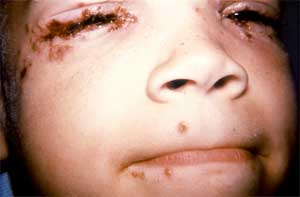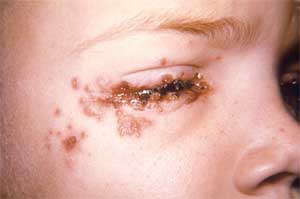Eye Herpes | Ocular Herpes | Do you have Herpes in or around your eye?
What is Ocular Herpes or Eye Herpes?
Herpes affecting the area around and in the eye is referred to as ocular herpes. It is usually caused by HSV-1, the herpes simplex virus responsible for most cold sores. It is estimated that 500,000 Americans have experienced some form of ocular herpes, with close to 50,000 new and recurring cases occurring each year, 20,000 new cases and 28,000 recurrent cases. There is no cure for eye herpes.
The eyelids, the mucous membrane that covers the eyeball and the under surface of the eyelid, and the cornea are the parts of the eye ocular herpes generally infects. Ocular herpes is the most common infectious cause of corneal blindness in the U.S.

Herpes Around the Eye
Eye herpes never leaves the body after an initial infection. The virus lies in a dormant stage within the nerves. Previous studies show that once people develop ocular herpes, they have up to a 50 percent chance of having a recurrence. This second flare-up could come weeks or even years after the initial occurrence. The more frequently the infection recurs, the more likely there is to be further damage from the virus.
What are the types of Ocular or Eye Herpes?
- Keratitis: One of the first signs of infection is inflammation of the cornea, or keratitis. Herpes keratitis is the most common form of eye herpes. The infection can spread to the middle layers of the cornea, which may cause permanent scarring, loss of vision and, occasionally, blindness. Stromal keratitis occurs when this happens and the infection goes deeper into the layers of the cornea. Although this is rare, the National Eye Institute reports that stromal keratitis is the leading cause of corneal scarring that results in blindness in the United States.
- Iridocyclitis: Another serious form of ocular herpes is iridocyclitis, the inflammation of the iris and ciliary body of the eye. This can cause severe sensitivity to light, blurred vision, pain and redness.
- Herpes retinitis: When this infection occurs in the retina or the inside lining of the back of the eye, it is known as herpes retinitis.

Herpes in the eye
What are the Symptoms and Signs for Ocular or Eye Herpes?
Common symptoms for ocular herpes are pain in and around the eye, tearing, redness, scratchiness, sensitivity to light, blurred vision, and sometimes vision loss. The symptoms resemble those of the common conjunctivitis infection. It usually only affects one eye. Several recurrences may result in the formation of deep ulcers, permanent scarring, and a loss of feeling when the eye is touched.
How do you get Ocular or Eye Herpes
Ocular herpes can be transmitted through contact with another person who is having a herpes outbreak. Eye contact with someone’s cold sore could be a source of contamination.
You can also contract herpes of the eye by self-inoculation and contamination during your own active herpes infection or cold sore. Another reason for good hygiene! Always wash your hands after you touch a cold sore, and don’t touch your eyes until you do.
How do you Diagnosis Ocular or Eye Herpes?
Your doctor can use a slit lamp microscope to examine your eye under high magnification.
What is the Treatment for Ocular or Eye Herpes?
If you think you may have ocular herpes, it is recommended that you see an ophthalmologist or eye doctor. Treatment for eye herpes depends on where the infection is located in the eye. Some ocular herpes treatments could aggravate the outbreak and, therefore, should be treated on a case-by-case basis. Your doctor, with treatment programs, can help control outbreaks.To reduce damage and scarring, your health care provider may prescribe an antiviral eyedrop such as trifluridine, an antiviral medication taken orally, or even corticosteroid drops.The doctor may even scrape the affected area of the cornea.

Top 10 Herpes Facts
Sex Health Guru Video Tip brought to you by Alice W. Kp M.D. John Hopkins Hospital, Watch the Video

Featured Article
The Truth about HSV-1 and HSV-2 American Social Health Association (ASHA), read the Article

Other Infections
Do you also think you may have been exposed to another STD? Find help now. www.stdsite.com



